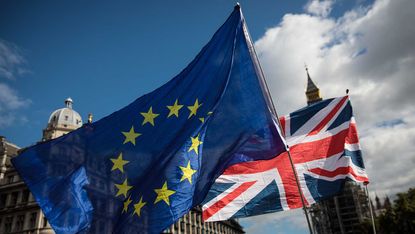Why do Brits in the EU fear being used as bargaining chips?
Campaigners say they feel ‘massively downgraded’ as Brexit looms

British citizens in the EU have asked that they are not used as “a bargaining chip for the second time” in forthcoming Brexit trade talks.
In a letter to the EU’s chief Brexit negotiator, Michel Barnier, two campaign groups have said they worry they are being “massively downgraded” and that they fear they will be used by Brussels as leverage.
“Our remaining rights should not be deferred once again,” said the joint letter, signed by Jane Golding, the co-chair of British in Europe and Nicolas Hatton, the co-founder of the3million.
Subscribe to The Week
Escape your echo chamber. Get the facts behind the news, plus analysis from multiple perspectives.

Sign up for The Week's Free Newsletters
From our morning news briefing to a weekly Good News Newsletter, get the best of The Week delivered directly to your inbox.
From our morning news briefing to a weekly Good News Newsletter, get the best of The Week delivered directly to your inbox.
“They should not be bargained against, made dependent on or packaged within other negotiation issues. We must not be made bargaining chips a second time.”
Their anxiety has been heightened because the issue of their continued right to move and work across Europe was not resolved in the withdrawal agreement, which will be formally ratified this week.
Instead, that important can was kicked into the second phase of negotiations because the UK wanted to end uncontrolled migration to Britain.
British citizens in the EU feel vulnerable in those negotiations because free-movement talks have no consequence for EU citizens already in the UK as they have the birthright, as citizens of a member state, to continue to live or work wherever they like in the EU.
However, British nationals in the EU, as citizens of a third country after Brexit has gone through this Friday, will not enjoy that right.
Many argue that they moved to another member state in good faith under the rules of the EU and those who moved to the continent before the end of the transition period should retain those rights.
Some pro-Brexit British nationals living in Spain have previously told Channel 4 News they now regret voting Leave as they face such an uncertain future in the EU after Brexit.
“I know it might be selfish but I think on reflection now we'd probably vote, if we had a referendum, the other way now,” said one.
Asked if he felt he had “shot himself in the foot,” he replied: “We might have done, we may very well have done.”
–––––––––––––––––––––––––––––––For a round-up of the most important stories from around the world - and a concise, refreshing and balanced take on the week’s news agenda - try The Week magazine. Start your trial subscription today –––––––––––––––––––––––––––––––
Create an account with the same email registered to your subscription to unlock access.
Sign up for Today's Best Articles in your inbox
A free daily email with the biggest news stories of the day – and the best features from TheWeek.com
-
 Shopping trolleys: the new must-have accessory
Shopping trolleys: the new must-have accessorySpeed Read Sales are soaring as new designs help shed that old-fashioned image
By Adrienne Wyper, The Week UK Published
-
 5 ways to help the environment while on vacation
5 ways to help the environment while on vacationThe Week Recommends An afternoon of planting trees could be the best part of your trip
By Catherine Garcia, The Week US Published
-
 Doctors are taking on dental duties in low-income areas
Doctors are taking on dental duties in low-income areasUnder the radar Physicians are biting into the dentistry industry
By Devika Rao, The Week US Published
-
 'Europe is now beginning to tackle its military to-do list'
'Europe is now beginning to tackle its military to-do list'Instant Opinion Opinion, comment and editorials of the day
By Harold Maass, The Week US Published
-
 Will Aukus pact survive a second Trump presidency?
Will Aukus pact survive a second Trump presidency?Today's Big Question US, UK and Australia seek to expand 'game-changer' defence partnership ahead of Republican's possible return to White House
By Sorcha Bradley, The Week UK Published
-
 It's the economy, Sunak: has 'Rishession' halted Tory fightback?
It's the economy, Sunak: has 'Rishession' halted Tory fightback?Today's Big Question PM's pledge to deliver economic growth is 'in tatters' as stagnation and falling living standards threaten Tory election wipeout
By Harriet Marsden, The Week UK Published
-
 Stormont power-sharing in sight: 'good news' for Northern Ireland?
Stormont power-sharing in sight: 'good news' for Northern Ireland?Talking Point Unionists vote to end two-year boycott after agreeing legislative package to address post-Brexit trading arrangements
By The Week UK Published
-
 Why your local council may be going bust
Why your local council may be going bustThe Explainer Across England, local councils are suffering from grave financial problems
By The Week UK Published
-
 Rishi Sunak and the right-wing press: heading for divorce?
Rishi Sunak and the right-wing press: heading for divorce?Talking Point The Telegraph launches 'assault' on PM just as many Tory MPs are contemplating losing their seats
By Keumars Afifi-Sabet, The Week UK Published
-
 How Finland's tightening presidential race could affect future of Europe
How Finland's tightening presidential race could affect future of EuropeUnder the radar Country has key geostrategic position along Nato's longest border with an increasingly belligerent Russia
By Harriet Marsden, The Week UK Published
-
 How would a second Trump presidency affect Britain?
How would a second Trump presidency affect Britain?Today's Big Question Re-election of Republican frontrunner could threaten UK security, warns former head of secret service
By Harriet Marsden, The Week UK Published